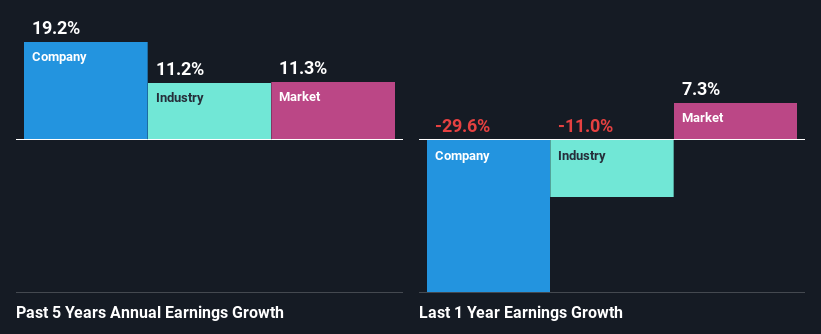Systemair AB (publ)'s (STO:SYSR) Stock Has Been Sliding But Fundamentals Look Strong: Is The Market Wrong?
With its stock down 5.2% over the past three months, it is easy to disregard Systemair (STO:SYSR). However, stock prices are usually driven by a company’s financial performance over the long term, which in this case looks quite promising. In this article, we decided to focus on Systemair's ROE.
Return on Equity or ROE is a test of how effectively a company is growing its value and managing investors’ money. Put another way, it reveals the company's success at turning shareholder investments into profits.
How To Calculate Return On Equity?
The formula for return on equity is:
Return on Equity = Net Profit (from continuing operations) ÷ Shareholders' Equity
So, based on the above formula, the ROE for Systemair is:
13% = kr771m ÷ kr6.0b (Based on the trailing twelve months to January 2025).
The 'return' is the income the business earned over the last year. One way to conceptualize this is that for each SEK1 of shareholders' capital it has, the company made SEK0.13 in profit.
Check out our latest analysis for Systemair
Why Is ROE Important For Earnings Growth?
So far, we've learned that ROE is a measure of a company's profitability. Depending on how much of these profits the company reinvests or "retains", and how effectively it does so, we are then able to assess a company’s earnings growth potential. Assuming all else is equal, companies that have both a higher return on equity and higher profit retention are usually the ones that have a higher growth rate when compared to companies that don't have the same features.
Systemair's Earnings Growth And 13% ROE
To begin with, Systemair seems to have a respectable ROE. And on comparing with the industry, we found that the the average industry ROE is similar at 11%. Consequently, this likely laid the ground for the decent growth of 19% seen over the past five years by Systemair.
We then compared Systemair's net income growth with the industry and we're pleased to see that the company's growth figure is higher when compared with the industry which has a growth rate of 11% in the same 5-year period.

The basis for attaching value to a company is, to a great extent, tied to its earnings growth. What investors need to determine next is if the expected earnings growth, or the lack of it, is already built into the share price. Doing so will help them establish if the stock's future looks promising or ominous. Has the market priced in the future outlook for SYSR? You can find out in our latest intrinsic value infographic research report.
Is Systemair Using Its Retained Earnings Effectively?
Systemair has a three-year median payout ratio of 33%, which implies that it retains the remaining 67% of its profits. This suggests that its dividend is well covered, and given the decent growth seen by the company, it looks like management is reinvesting its earnings efficiently.
Additionally, Systemair has paid dividends over a period of at least ten years which means that the company is pretty serious about sharing its profits with shareholders. Our latest analyst data shows that the future payout ratio of the company over the next three years is expected to be approximately 34%. Therefore, the company's future ROE is also not expected to change by much with analysts predicting an ROE of 15%.
Conclusion
In total, we are pretty happy with Systemair's performance. Specifically, we like that the company is reinvesting a huge chunk of its profits at a high rate of return. This of course has caused the company to see substantial growth in its earnings. That being so, a study of the latest analyst forecasts show that the company is expected to see a slowdown in its future earnings growth. To know more about the latest analysts predictions for the company, check out this visualization of analyst forecasts for the company.
Have feedback on this article? Concerned about the content? Get in touch with us directly. Alternatively, email editorial-team (at) simplywallst.com.
This article by Simply Wall St is general in nature. We provide commentary based on historical data and analyst forecasts only using an unbiased methodology and our articles are not intended to be financial advice. It does not constitute a recommendation to buy or sell any stock, and does not take account of your objectives, or your financial situation. We aim to bring you long-term focused analysis driven by fundamental data. Note that our analysis may not factor in the latest price-sensitive company announcements or qualitative material. Simply Wall St has no position in any stocks mentioned.
 Wall Street Journal
Wall Street Journal